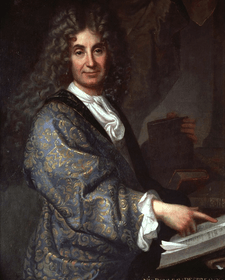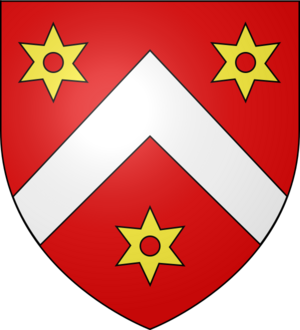Nicolas Boileau-Despréaux facts for kids
Quick facts for kids
Nicolas Boileau-Despréaux
|
|
|---|---|
 |
|
| Born | 1 November 1636 Paris, Kingdom of France |
| Died | 13 March 1711 (aged 74) Paris, Kingdom of France |
| Occupation | Poet, critic |
| Alma mater | College of Sorbonne, Paris |
Nicolas Boileau-Despréaux (born November 1, 1636 – died March 13, 1711) was a famous French poet and critic. People often just called him Boileau. He helped change French poetry a lot, making it more organized and clear. He was inspired by an ancient Roman poet named Horace.
Contents
Early Life and Schooling
Nicolas Boileau was the fifteenth child in his family. His father, Gilles Boileau, worked in the Parliament of Paris. Nicolas had two older brothers who also became well-known writers. The family name "Despréaux" came from a small property near Paris.
Nicolas's mother died when he was only two years old. He was a delicate child and didn't always get the best care. Some people believe this made him a bit serious and unsympathetic. He grew up with one main goal: to dislike "stupid books."
He went to school at the Collège de Beauvais. Then, he studied theology (the study of religion) at the Sorbonne. But he soon switched to law. He became a lawyer in 1656. However, he quickly found the law profession full of tricks and unfairness. He didn't like it at all.
In 1657, his father passed away, leaving him a small amount of money. From then on, Nicolas decided to focus completely on writing.
Becoming a Writer (1660s)
Boileau's first important works were his satires. These were poems that made fun of or criticized things. His first satire, written around 1660, was about leaving Paris. He soon wrote eight more, and later, the total grew to twelve.
His satires were important for two reasons. First, he cleverly made fun of popular writers of his time. He openly challenged the old ways of writing poetry. Second, he showed how the French language could be used in poetry. He made French poems clear, strong, and very regular in their structure. Before him, French poetry was not as organized.
Boileau greatly admired the famous playwright Molière. He wrote poems praising him. Around 1664, he wrote a book called Dialogue sur les héros de roman. This book made fun of the long, complicated adventure stories that were popular then. It helped end the popularity of those kinds of novels.
In these early years, Boileau often met with other famous writers like Molière and Jean Racine. They would discuss literature together. Boileau was a loyal friend to Molière and Racine and often helped them.
In 1666, he officially published some of his satires. Later, starting in 1669, he began writing epistles. These were poems that were more serious and thoughtful than his satires. They were also more polished in their style. The Épîtres helped him gain the favor of King Louis XIV. The king even asked him which of his poems he liked best! Boileau cleverly recited some new lines he had written in the king's honor. Because of this, he received a yearly payment from the king.
Influential Works (1670s)
In 1674, Boileau published two very important works: L'Art poétique (The Art of Poetry) and Le Lutrin. L'Art poétique was like a rulebook for poets. It explained how to write good poetry and different types of poems. This book was very influential. It was even translated into English and inspired English poets like Alexander Pope.
L'Art poétique had four parts. The first and last parts gave general advice about using good sense in poetry. The second part talked about different poem styles, like pastoral poems (about nature), elegies (sad poems), and odes (praise poems). The third part focused on tragic plays and epic poems (long stories about heroes). While his rules were helpful, some people felt they made poetry too strict. Boileau was a great critic, but not always a great poet himself.
Also in 1674, Boileau translated a book called On the Sublime by an ancient writer named Longinus. This made Longinus's ideas about powerful and moving writing available to more people.
In 1677, King Louis XIV made Boileau the royal historian. After this, he wrote less. During this time, he wrote a satire about women and an ode about the capture of Namur. He also wrote an epistle about the love of God.
His satires had made him many enemies. His 10th satire, about women, caused a lot of debate. Even a religious leader said that satire was not Christian. Boileau defended his art, saying it was important. It wasn't until 1684 that he was accepted into the Académie française, a famous French council for language and literature. The king himself had to insist on it. In 1687, he moved to a country house outside Paris.
Later Years and Legacy (1700–1711)
In 1705, Boileau sold his house and moved back to Paris. He lived near the Notre Dame cathedral. In his 12th satire, he criticized the Jesuits, a religious group. This satire was written around 1705.
He then worked on putting together a complete collection of his works. But the Jesuits tried to stop the publication of his 12th satire. These troubles are said to have made him sicker. He passed away on March 13, 1711.
Boileau was known as a kind and honest person. Many stories are told about how he spoke his mind, even to the king. He was also very generous.
He holds a very important place in French literature. He was the first to set clear rules for French poetry. He showed how important it was to craft poems carefully. His influence was also strong in English literature, especially through poets like Alexander Pope.
Even though his work was sometimes criticized, many of his ideas about good writing have been accepted by writers who came after him.
See also
- In Spanish: Nicolás Boileau para niños
- Liksom en Herdinna, högtids klädd, a 1790 song by Carl Michael Bellman, closely following Boileau's guide to pastoral verse
Sources
- Sainte-Beuve, Causeries du lundi, vol. vi.; F. Brunetière, "L'Esthétique de Boileau" (Revue des Deux Mondes, June 1889), and an exhaustive article by the same critic in La Grande Encyclopédie; Gustave Lanson, Boileau (1892), in the series of Grands écrivains français.
 This article incorporates text from a publication now in the public domain: "Nicolas Boileau-Despréaux". Catholic Encyclopedia. (1913). New York: Robert Appleton.
This article incorporates text from a publication now in the public domain: "Nicolas Boileau-Despréaux". Catholic Encyclopedia. (1913). New York: Robert Appleton. - This article incorporates text from the public domain 1907 edition of The Nuttall Encyclopædia.
 | Emma Amos |
 | Edward Mitchell Bannister |
 | Larry D. Alexander |
 | Ernie Barnes |


